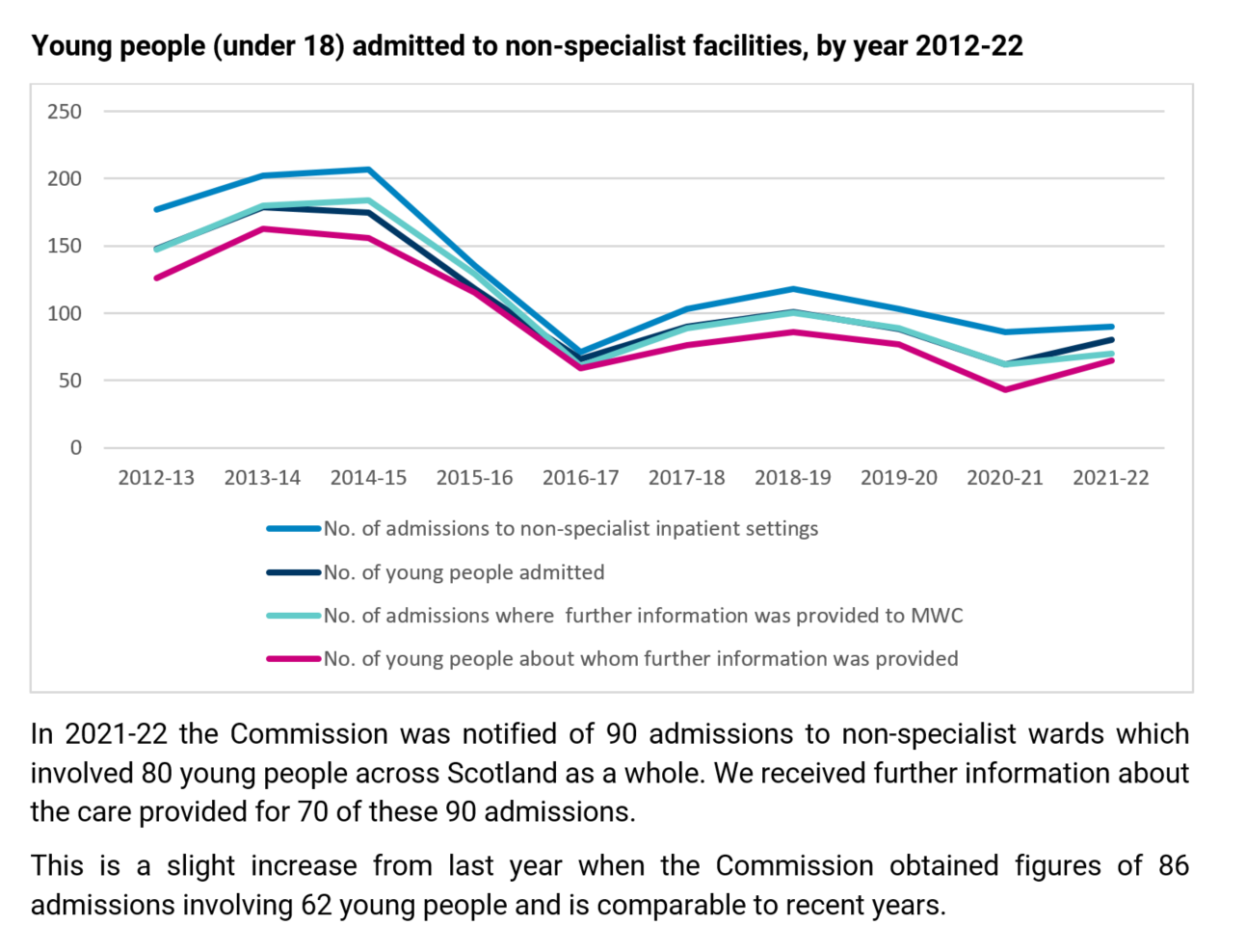Rise in numbers of young people admitted to adult wards for mental health treatment
Publication date: 1 Dec, 2022
In 2021-22, the number of young people under the age of 18 admitted to non-specialist hospital wards – primarily adult wards – for treatment of mental ill health in Scotland was 90 admissions involving 80 young people. This is an increase on 2020-21 when there were 86 admissions involving 62 young people.
The figures comes from a report published today by the Mental Welfare Commission and relate to the period from 1 April 2021 to 31 March 2022.
While not directly comparable in timescales, the figures can be read alongside the latest Public Health Scotland data, which shows that from 1 October 2020 to 30 September 2021, 51.3% of overall admissions of children and young people under the age of 18 for mental health care were to non-specialist wards. This was the first time in recent years that the majority of admissions were not to specialist child and adolescent inpatient units.
Of all the young people admitted to non-specialist wards, 23% were care experienced and looked after and accommodated by a local authority.
Reasons for young people on adult wards
Reasons for young people being admitted to adult wards include a shortage of specialist beds, and a lack of provision for:
- highly specialised care for young people with a learning disability,
- young people who have offended due to mental health difficulties and require forensic care; and
- young people who require intensive psychiatric care provided in specialised units.
Time spent on adult wards
Just over half of all admissions of young people to non-specialist wards were short in length, however 49% remained on those wards (mostly adult) for over a week and 16% remained for over five weeks.
Of the 14 young people who remained in a non-specialist bed for over five weeks, five required intensive psychiatric care unit (IPCU) admission at some point during their stay.
Suzanne McGuinness, executive director, social work, Mental Welfare Commission, said:
“In some instances it may be appropriate for a child or a young person to be admitted to a non-specialist ward if available alternatives would not be in their best interests.
“But we believe this should only happen in rare situations. For the vast majority of children and young people, being cared for in a unit designed for their age group, not for adults, should be the norm.
“I also note the high number of young people who were care experienced amongst those we see on non-specialist units – far higher than the average in the community.
“Elsewhere in this report, we welcome the government’s progress towards developing inpatient facilities for children and young people who require specialist forensic care, with the partial opening of the National Secure Adolescent Inpatient Service (NSAIS) anticipated for 2023. We had called for this in many of our previous reports so it is good to see it will soon be operational.
“Less positively, the development of an inpatient unit for children and young people who have a learning disability has not progressed. Scotland has no facilities for this group of young people to receive hospital-based mental health care. We are concerned to hear that capital funding for this is not now expected before 2027. We are keen that Scottish Government reviews this position given the continuing need for inpatient admissions in the under 18 population with a learning disability.”
The report published today gives details of admissions by health board, by length of stay and by age group, along with many other data sets.
Notes
While the numbers have increased in 2021-22, they remains at a similar level to recent years, and are part of a continued improvement from the period before 2015, when numbers exceeded 200 admissions at times.
Scotland has three NHS regional adolescent in-patient mental health units for young people aged between 12-18 years, based in Glasgow, Edinburgh and Dundee.


